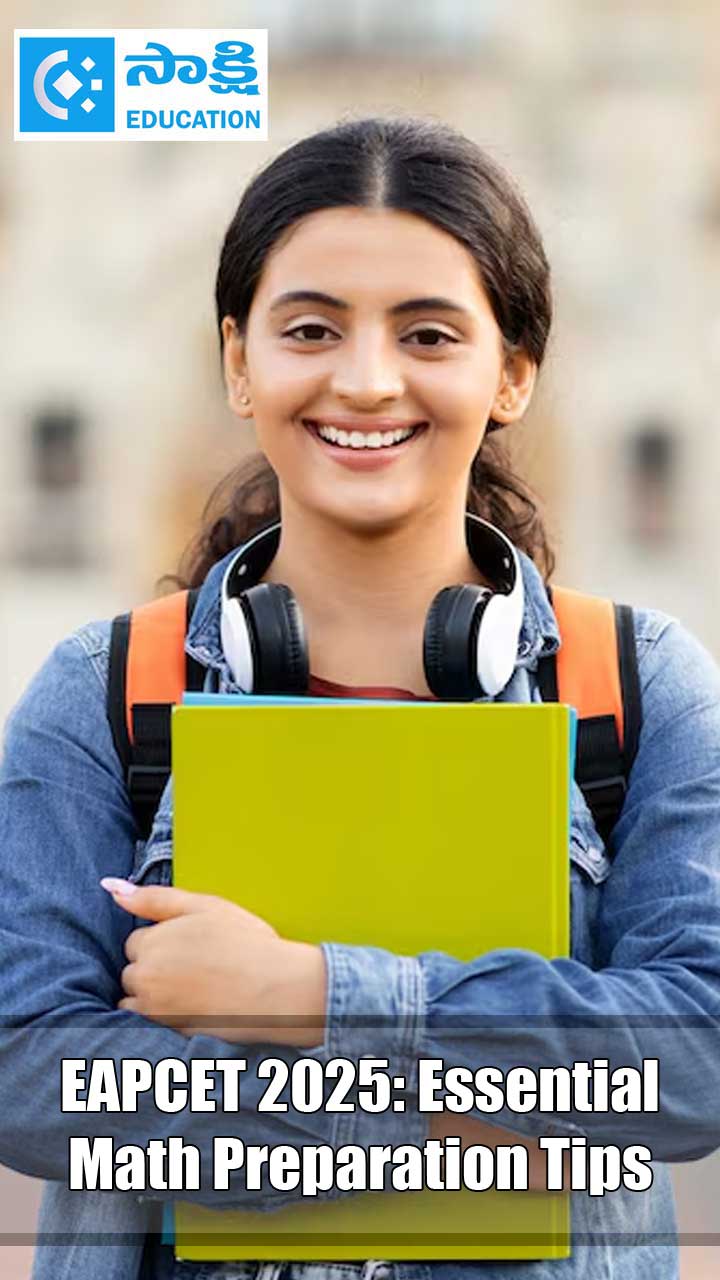Preparation Tips for NEET Physics
Sakshi Education
- Remember that as far as Physics is concern there is no much syllabus difference between NEET and EAMCET. More over NEET exam is more conceptual rather numerical. So, try to improve the knowledge related to the concepts.
- Prepare your own plan/time table so that all the topics are covered just two/three days before the final exam.
- Try to go through NCERT books and try to answer the questions given at the end of every chapter in these books.
- As the remaining time is very short of about 10 - 15 days, try to improve the ability of doing more questions in a short time with more accuracy.
- While going through every topic list out the important formulae and conceptual points so that these can be again revised two/three days before the exam.
- Practice Level or Level II problems number of possible.
- Practice more number of topic wise assignments and consolidated tests.
- Download AIPMT Question Papers and practice them as sample papers or take them as Mock Tests.
- While doing the assignments/tests take care about the time management.
- Completing the biology and chemistry paper within 2hrs is also very important to get more score in physics.
- Do not leave any topic.
- Even in the difficult topic you feel, try to learn fundamental definitions, concepts & formulae and practice related problems.
- Concentrate on difficult areas in the easiest topics you feel, to have a command on these topics.
- Study regularly and moderately. Do not pick new topic at this point of time.
- The most difficult topics all together may be 10 % to 20 %. It doesn’t matter even if you leave this part.
- Most of the BIPC students feel physics very difficult. Even in solving simple mathematical calculations also they try to avoid. This is all mere psychological rather real.
- BIPC students should learn few fundamental formulae related mathematics.(such differentiation, integration etc.)
- They lose marks in physics not because of its difficultness, but due to their psychology.
- Be confident on your preparation.
- Practice formulae based problems.
- Go through academy text book for theory questions especially topics like Physical Optics, Nuclear Physics etc.
- Learning basics in all topics and thorough knowledge in selected topics can lead to a better rank.
- Give equal importance for both first and second year topics..
- Be thorough with topics like Gases, Nuclear Physics Optical Spectra which are useful for Chemistry.
- More theory based questions will be asked are atomic physics, nuclear physics semiconductor and communications.
- Attempt questions carefully as there is negative marking. Do not answer a question in which you have no confidence.
TOPICS WISE SUGGESTIONS / TIPS :
Be thorough with Mechanics (Relative motion, Uniform circular motion, Conservation of momentum, Conservation of angular momentum, rolling motion etc.).
Kinematics:
Be thorough with Mechanics (Relative motion, Uniform circular motion, Conservation of momentum, Conservation of angular momentum, rolling motion etc.).
Kinematics:
- Must be very clear with concepts like displacement, acceleration, average velocity, relative velocity. Try to visualize the problems in the mind to effectively tackle them.
- In projectiles finding Range, Maximum height, Time of flight, velocity at any point on the trajectory is important. Generally in this area questions are straight and fair.
- Questions based on graphical data are also important.
- Practice the conceptual questions based on Laws of Motion and application of the principle of conservation of linear momentum. While working out problems related to connected bodies, students should necessarily draw free body diagram.
- Easy to prepare. Finding velocity of the colliding bodies in one dimensional elastic head on collision are imortant.
Work Power Energy:
Work- Energy Theorem are the main subtopics. Sometimes it is advantageous to do the problem using law of energy.
Motion Of System Of Particles And Rigid Body:
Work- Energy Theorem are the main subtopics. Sometimes it is advantageous to do the problem using law of energy.
Motion Of System Of Particles And Rigid Body:
- Students can easily answer questions on vertical circular motion as they will be on expected models.
- Problems of finding Torque, when position vector and force vector are given are important.
- Finding Moment of inertia of regular bodies using parallel and perpendicular axes theorem are important.
- Also, work out problems based on conservation of angular momentum and rolling motion.
- Be clear with basic forces in nature. Simple question on Universal law of gravitation, variation of ‘g’ with altitude, depth, latitude are important.
- Problem solving technique using energy conservation helps arrive at the answers.
- Problem on orbital velocity, escape velocity are very important.
- The advantage with elasticity is limited sub-topics, limited models of problems. The main concepts are with different stress, strain related modulus of elasticity and Poisson’s ratio. To answer theory bits, concepts like elastic fatigue, behavior of wire under increasing load must be understood.
- Examples of surface tension from daily life, surface energy, relation between surface tension and surface energy, angle of contact, capillarity. Effect of temperature on surface tension, excess pressure in soap bubble and liquid drop are topics from which we can expect questions. Problems like finding work done to split big drop into number of droplets, work done to blow a soap bubble are important.
- Try to be thorough with fluid mechanics as it is inter-related to many other topics in physics.
- Problems based on Bernoulli’s theorem, velocity of efflux are more important.
- Have clear idea of zeroth law of thermodynamics, Joules law, and first law of thermodynamics. Principle of calorimeter, problems related to different thermodynamic processes are important. While solving the problems related to work done in adiabatic and isothermal keep in mind the sign conventions.
- Do some models on Carnot engine – Efficiency and Coefficient of performance.
- Be thorough with the concepts on Kinetic theory of gasses.
Kinetic theory of gasses :
Simple and easy topic in which conceptual questions can be practiced.
Oscillations and waves:
Simple and easy topic in which conceptual questions can be practiced.
Oscillations and waves:
- Students should understand the term phase and its importance in solving problems.
- Different relations for velocity, acceleration, maximum and minimum values are to be remembered.
- To solve problems related to loaded spring, students should have clear idea of spring constant, changes in the time period, when it is cut and coupled with other springs.
- Try to work out more numerical on Doppler effect and pipes
In optics, wave optics may be covered first as the content is less compared to Geometrical Optics. Regarding wave optics concentrate on theory based questions.
Theory based questions will be asked from the chapters like Modern physics, Semiconductor devices, Communication systems. So one must keep this in their mind at the time of the preparation.
Another common area is Gravitation, Electrostatics and Magnetism with same principles and applications by chance of variables. Coulombs law becomes Newton’s Gravitational law. The analogue of the Gauss’s Law can be used for evaluation of gravitational field. Electricity and Magnetism can be studied together.
Give top priority to Modem Physics, Elecrostatics, Magnetic effects of current and earth’s magnetism, Heat & Thermo Dynamics, SHM and Oscillations, Current Electricity, Gravitation & Rotational Mechanics, EMI, AC & EM Waves, Optics, Kinematics.
Problem Solving
Theory based questions will be asked from the chapters like Modern physics, Semiconductor devices, Communication systems. So one must keep this in their mind at the time of the preparation.
Another common area is Gravitation, Electrostatics and Magnetism with same principles and applications by chance of variables. Coulombs law becomes Newton’s Gravitational law. The analogue of the Gauss’s Law can be used for evaluation of gravitational field. Electricity and Magnetism can be studied together.
Give top priority to Modem Physics, Elecrostatics, Magnetic effects of current and earth’s magnetism, Heat & Thermo Dynamics, SHM and Oscillations, Current Electricity, Gravitation & Rotational Mechanics, EMI, AC & EM Waves, Optics, Kinematics.
Problem Solving
- Read the given numerical carefully.
- Think how the given statement(s) relates to some theory or law and if the relation gives some yields or the desired answer.
- Check if the statement(s) given relates to a theory which leads to answer you require or further lead to some theory which in turn yields desired answer.
- Think of the rules, and logic sets involved in the given question.
- Think of the formulae or set of rules that you require relating the quantities in question
- Identify the constants that you require to establish relationship between given quantities.
- Observe if all the quantities (including constants) are in same system of units, if not convert them using conversion rules.
- Trying to solve the same problem in 2 or more methods will be useful at the time of Preparation.
- Work out as many numericals as possible in every chapter.
- Identify the typical numerical examples in every chapter and go through them frequently.
Published date : 27 Apr 2013 02:12PM














